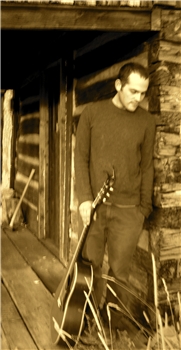




{gregory alan isakov} Peering out at the audience from the stage at the Boulder Theater is Gregory Alan Isakov. He is sitting in a chair and cradling his favorite guitar. Shielding his eyes from the lights, the 27 year old says, “Thank you for being so quiet. I feel like a rock star up here.” Four minutes later, after he finishes his song, Isakov coyly explains how he opened-up for Fiona Apple the week before – on the same stage. Cheers ripple through the audience. But instead of bloating egomaniacal, the humble Isakov follows the moment of glory by stating the facts: of how he played the show, met Fiona, and then – half an hour later he was in bed, reading his Harry Potter book. “I’m so not a rock star,” Isakov joked. It’s nearly axiomatic that if you run into Gregory Alan Isakov at the gas station, you will not retain the impression that he was neither rousing, nor charismatic. Chances are that the interaction would be awkward. And chances are that the encounter would end with Isakov quickly ducking back into his ’82 pick-up and heading down the road, toward the country. But watch this man walk onto the Boulder Theater’s stage, with his back arched downward, the house darkened and the stage lights smoky. Watch him sit down in the middle of the stage in that solitary chair and pick-up his guitar. Because then, without prompting or warning or human voice – he will begin playing. And that voice you heard at the gas station? Suddenly it transforms into something magical, as if it were worn and aged over the sandy bottom of hundreds of creek beds. And what you’re bound to hear come out of Isakov’s mouth and guitar is, at times, astonishing. It is immersed in everything wiser than a man double his years could produce. And while he resists the label, Isakov is both a singer and a songwriter. Testament to that is his musical landscape, which is at once masterful and precise. His catalog is moody and rutted-out in some complicated and magical way – as though some grand disaster swept along his grassy plains, leaving only heartbreak and wind-torn hallucinations behind. Isakov traces-out careful characters living in a grayscale world. Always, his sketches are of people that possess an organic and all-too-human presence. In this, Isakov is drawing pictures of himself – but he is also coloring every one of us. Until I met Gregory Alan Isakov I had never seen one person hush the rooms that he has. From theaters to small venues. And after listening and watching, it is not all that complicated to understand why. For the typically shy Isakov, the stage is a holy place where, sitting behind his guitar and a microphone, he thrives and provides himself a space to illustrate his depths, his kindness and his genuine character. And while Isakov has a band (The Freight), he sits on most of these lonely stages by himself – without pomp or pretension, or any concealment from thousands of wondering eyes. He wears only a simple shirt, some worn pants, a beat-up pair of boots and most likely, on a given night, he smells of wood smoke. Why is it that Isakov can stumble at the gas station, but when faced with hundreds of people in the audience he is perfect, calm and thriving? For him the reason is not strange, or even complex. It’s because there, on stage – he has a chance to give everything. In the gas station he can only give his money. For Isakov, music and living are analogous. For him, life is about falling in love with the world as many times as possible. And music – his music – is the story of that love. Isakov is a simple man. He lives in a barn on a farm outside of Lyons where he maintains the greenhouse. He is not rich in finances, nor does he care to be. A horticulturist by trade, Isakov is not interested in running the city race. When asked about his future, Isakov responded by saying that he wants to live simply, in a place where he doesn’t have to listen to engines on the road. He is interested in living earnestly and in the face of humility. At all times he is quiet, but kind and warm and glowing with rousing insights. Born in South Africa, Isakov does possess a certain feel that says – he is not from around these parts. He has spent time in the Middle East, playing his guitar on street corners and on the beach. He has traversed a good part of the Appalachian Trial. He has lived in Scotland. But it’s not these facts – taken as separate or a conglomerate, that speak to Isakov’s foreign texture. No, it’s something more than that – something larger than space and place. When Isakov and his family immigrated to the United States – a place in young Isakov’s mind that consisted solely of tornados and Disneyland – they landed in Philadelphia. There, something began to churn in Isakov and it began to manifest itself as a separation between he and the secular world around him.  Even for Isakov, who is a sponge and a student of the world around him, there was some fundamental and obvious disconnection. The world wasn’t agreeing with he. Happiness was elusive.
Even for Isakov, who is a sponge and a student of the world around him, there was some fundamental and obvious disconnection. The world wasn’t agreeing with he. Happiness was elusive.
And so Isakov retreated – inward. And over time, the prolific songwriter became prodigious in his craft. Listen to Isakov talk about songwriting and you will find someone talking about life-theories. For Isakov, everything begins by being humble. And early-on, he even recognized the fundamental notion that being in the middle of life and being awake to everything around you reaps mountains of reward. For him music is the perfect analogy, which teaches you, among other virtues, that everything is larger than the individual. And once you come to that grand understanding, remaining in that place of wonder is not terrifying. To the contrary – it is enlightening. And for Isakov the trust in this is also about the trust in his process – as a man and as a songwriter. Isakov will admit that he is not a great singer, nor is he a great guitar player. And while I don’t exactly agree with that – I do agree with the notion that when he combines the two elements: something altogether mystical happens. And as evidenced by the rooms I have seen hushed: Combine the two elements and Isakov becomes great. Somehow Isakov has the ability to condense a near-universe of emotion and wonderment into his small frame as though he has been levied these as his lifelong taxes. But say this to Isakov and he will respond by saying that there is no way that you can reasonably expect to condense all that into one person. Isakov questions this premise of religion: Isn’t everything, everywhere? Inspiration comes from everywhere, but the moments of reflection come being in-between moments: At the bus stations, or waiting for a train. In these moments of pause, Isakov spends his time in reflection and reverence on the life around him. And once sitting with his guitar, it’s about the articulation and the sketches in his head. And if he did his job – the spontaneity of his production will speak for him. The production, the song is the paycheck; the approval of a life well-lead. For Isakov, his songs and the characters in them are not limiting to one person, or one event or situation. Rather, Isakov’s songs are more universal. They’re about the “broader aquarium of things”, as he says. In this, Isakov is a storyteller of the heart. Gregory Alan Isakov is a long name. In the past it hasn’t fit on some showbills. People often forget his name if they don’t mispronounce it first. But for Isakov, he’s okay with this. He basks in the anonymity of his polished craft. For him the music is not about him. The performance is not about impressing the audience. For him, he is simply trusting in his craft and its effect; performing his duty on this salty earth. When asked about his goals for this coming year, Isakov replied that he wants to finish the album that he sunk all of his money into (due out in the Spring). And he wants to buy two burros so he can ride into town. Ask him if he is happy with his simple life and he may bring-up the question that is thrown at him as a performer, time and time again: Do you think you have made it? “Haven’t we all made it, already?” Isakov responds. Currently finishing his fourth album, Isakov’s work is submersed in images of loss and love and the coming and going of life; and now, the sea. He switches arrangements on nearly every track. And while he employs the whole range of traditional arrangements, from banjos and other strings and simple percussion – Isakov’s work is predicated on that one-on-one interaction between he and his guitar. He doesn’t often get “too-cocky” as he likes to say, about his arrangements. And while he keeps his movements relatively simple, there is an inherent element of complexity in his work. Mostly due to that magical interaction that occurs when Isakov picks up his guitar and begins to write – his lyrics are monstrous. Powerful. Dense and sweet and dark all at the same time. “We threw stones at the stars, but the whole sky fell…” In the words he sings, Isakov doesn’t appear to be from around here. But he is – just like you and I and the stars in the sky. He is man that wants to live and work, in earnest. And he is a man that will surely continue watching for the seeds of life being spread by the wind, like stars across the land. In this we are grateful to have an act of this magnitude at the tip of our noses; playing the venues that he is. Because in the end – Isakov is a major undiscovered talent – living among us, just outside of town and one turn towards the high country. Be sure to look for Isakov (who is booked by his manager, Sarah Levin – who books bluebook and a monthly event called “Under The Hood”, held at the Walnut Room) who will be making many appearances in Denver in the coming months – both before and after his much-anticipated CD Release. www.thefreight.net www.myspace.com/gregoryalanisakov |









